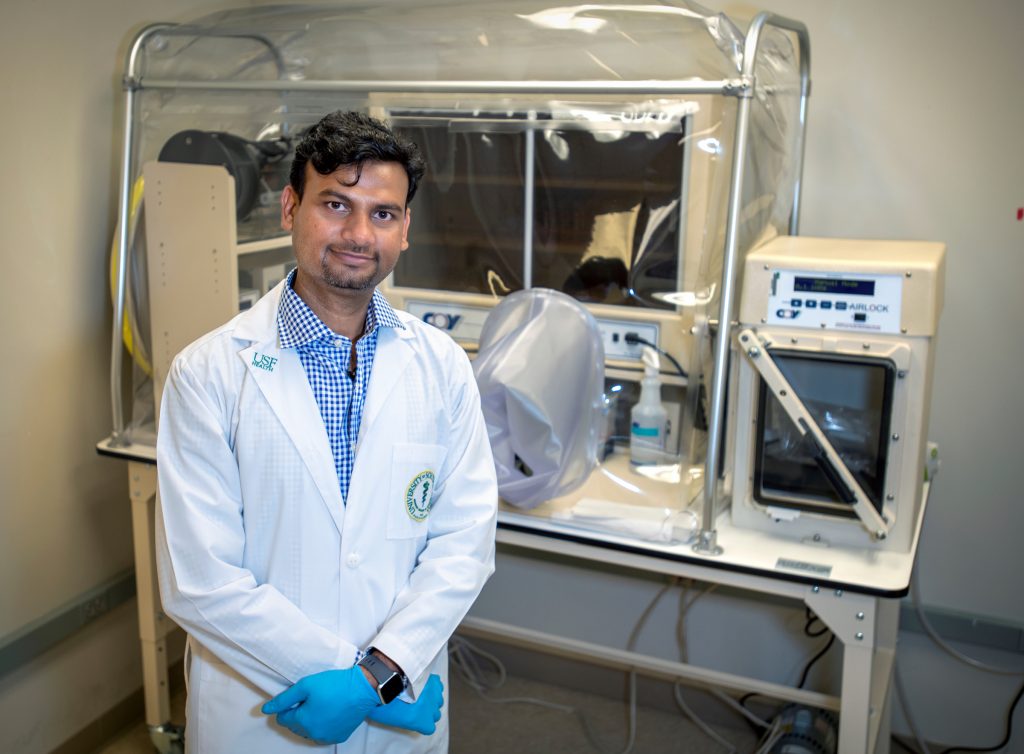The multisite study may identify measures to help prevent or delay mild cognitive impairment and dementias like Alzheimer’s disease
TAMPA, Fla. (April 19, 2022) – The Florida Department of Health (FDOH) Ed and Ethel Moore Alzheimer’s Disease Research Program has awarded the University of South Florida total expected funds of $743,661 over the next four years for a multisite clinical study titled “Role of the Microbiome in the Aging Gut and Brain of Floridian Older Adults.”

Hariom Yadav, PhD, was recently recruited to lead the USF Microbiome Research Center and his research focuses on the gut-brain connection (gut-brain axis) in relation to cognitive function.
The multidisciplinary project will investigate how diet influences the gut and oral microbiomes linked to brain health in adults ages 60 and older.
The FDOH consortium grant allows researchers at the USF Health Morsani College of Medicine to expand an initial study examining the microbiome in the aging gut and brain, started in Tampa late last year, to three other sites across the state: Florida Atlantic University (FAU), Boca Raton; Miami Jewish Health, Miami; and the University of Central Florida (UCF), Orlando. The consortium’s investigators expect to enroll a total of 400 older participants — both those who are cognitively healthy as well as those diagnosed with mild cognitive impairment and early-stage dementia.
By the time people are clinically diagnosed with early Alzheimer’s disease, or even mild cognitive impairment, degeneration of neurons in the brain is already quite extensive. For any treatments to stop or delay disease progression, patients at risk for Alzheimer’s must be identified and treated very early, said Hariom Yadav, PhD, an associate professor of neurosurgery and brain repair at the USF Health Morsani College of Medicine and director of the USF Center for Microbiome Research. “We desperately need noninvasive, inexpensive, clinically validated prognostic markers for Alzheimer’s disease that can be easily measured.”
The USF Health-led clinical research consortium will analyze bacteria composition in stool samples and saliva samples donated by study participants one time at the beginning of the study and then once a year for three to four years. Researchers will track alterations over time in the populations of oral and gut microorganisms, collectively known as the microbiome.
“Our study is the first of its kind in Florida exclusively focused on determining whether microbiome ‘signatures’ (biomarkers) from the gut and mouth can accurately predict an older adult’s risk of developing cognitive decline or dementia,” said Dr. Yadav, principal investigator for the FDOH consortium grant. “We also want to know if the signatures we identify can do that early enough to figure out strategies to delay or prevent those age-related diseases – either by modifying the individual’s diet or the microbiome composition itself.”
Using an interactive mobile app, study participants complete a daily dietary recall questionnaire and yearly tests of their memory, speed of thinking, and other cognitive abilities. Researchers will evaluate the effects of certain types of foods (i.e., protein, fruits, vegetables, dairy, carbohydrates, fermented foods, and junk food) on the growth of specific types of bacteria and see how the mix of bacteria changes if an individual’s diet is modified.
A growing number of studies correlate healthy guts, characterized by a well-balanced diversity of microorganisms, with healthy aging. Alzheimer’s disease is among the growing number of medical conditions linked to an imbalance of microorganisms (more bad microorganisms than good microorganisms) within the intestines. Emerging evidence also suggests that oral health and brain health are connected, including a large National Institute on Aging study linking gum disease with dementia.
Ronald Day and his wife Ardell, both 74, were among the first to enroll in USF Health’s novel microbiome study. Day, a retired pastor and volunteer chaplain at his Tampa continuing care retirement community, said he was intrigued by the idea that gut microorganisms may affect brain function and possibly be altered to combat cognitive decline.
“In the future, I’m hoping researchers learn enough from studies like this to suggest individualized diets, or other interventions, tailored to our own microbiomes,” Day said. “Anything that can help us maintain mental acuity as we age is so important.”
Aging is not a disease, Dr. Yadav emphasized, but as people age it’s particularly important to keep a healthy balance of intestinal microbes so that a potentially harmful strain of bacteria does not overgrow and monopolize the food source of beneficial bacteria. “A healthy gut allows you to adequately absorb the healthier nutrients and keep a check on the stimulation of inflammation, which is a root cause of several age-related conditions, including declining cognitive function that increases the risk for Alzheimer’s and other dementias,” he said.
The investigators collaborating with Dr. Yadav are Shalini Jain, PhD, Amanda Smith, MD, and Ambuj Kumar, MD, MPH, all from USF Health; Peter Holland, MD, of FAU; Marc Agronin, MD, of Miami Jewish Health; and Michal Masternak, PhD, of UCF.
Florida is among 10 U.S. states with the highest rates of Alzheimer’s disease. Approximately 580,000 people in Florida live with Alzheimer’s disease and this number is projected to increase to over 720,000 by 2025, according to the Alzheimer’s Association.
For more information about the microbiome in aging gut and brain study, please email jains10@usf.edu or call (813) 974-6281.
